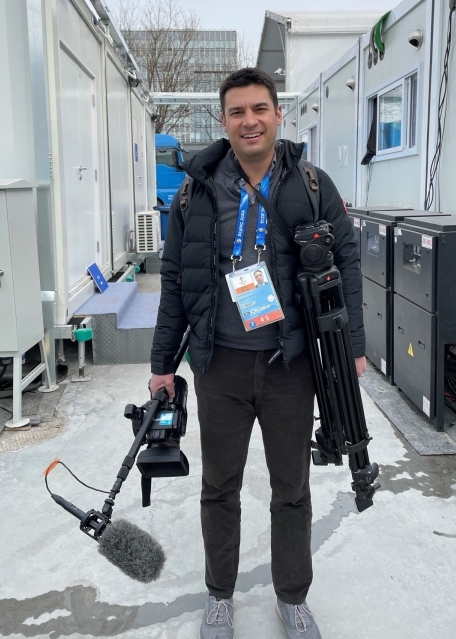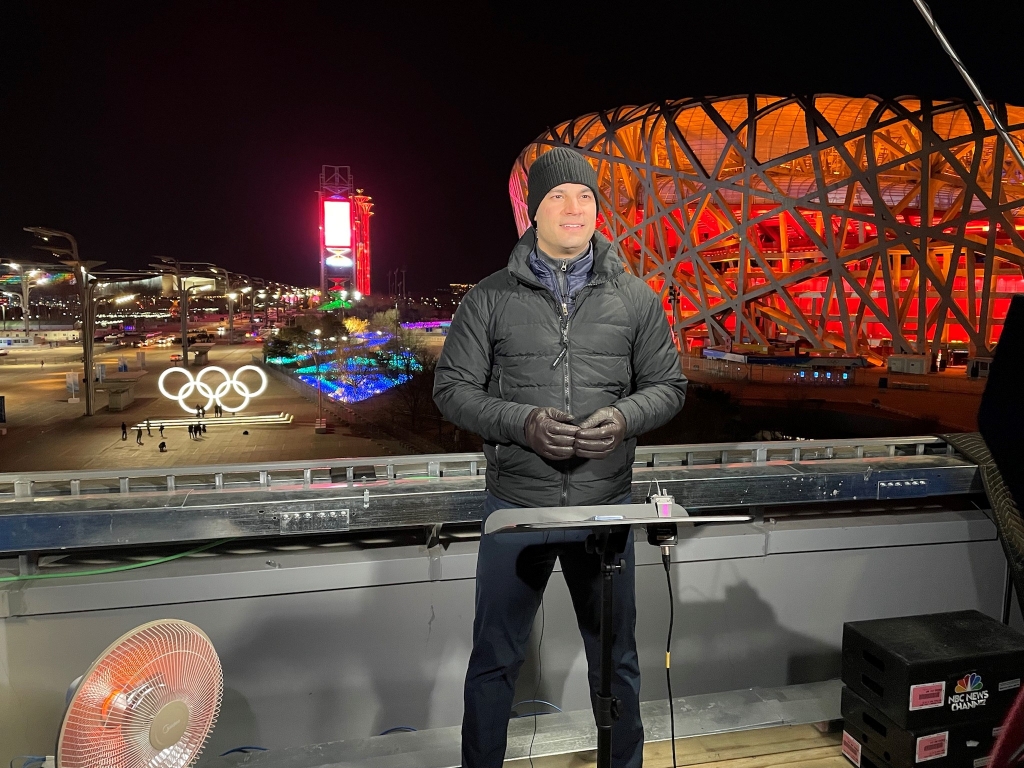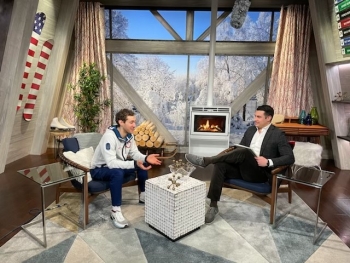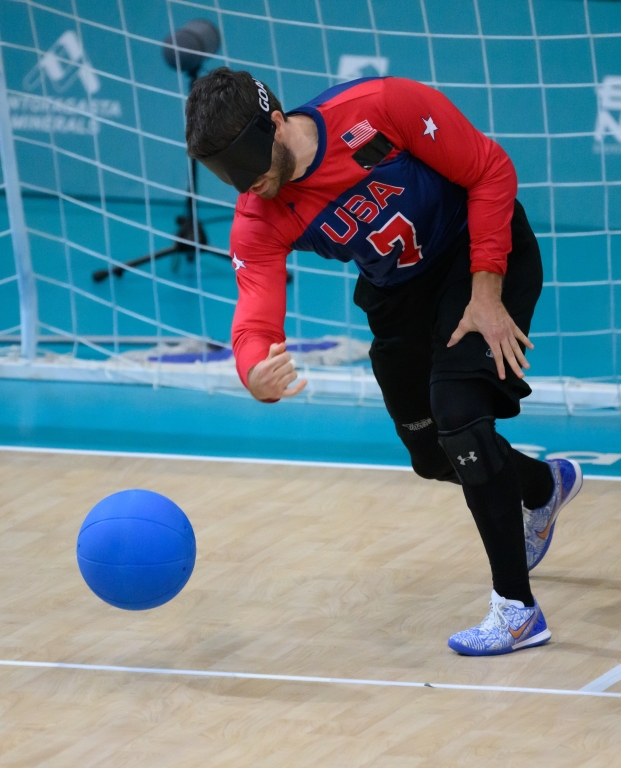Live from the Paris Olympics Alex Maragos ’13’s love of journalism started through the profession’s inside access to sports. He brings it full circle in covering the 2024 Paris Olympics for NBC 5 Chicago.
The delicate whooshes of blades touching the ice filled the mostly empty arena as Alex Maragos ’13 watched the 2022 Beijing Olympic Games figure skaters practice. Still under strict pandemic protocols due to China’s zero-COVID-19 policy, only 20 or so journalists and technical individuals dotted the arena while a handful of skaters focused on their routines. In that moment, the magnitude of Maragos’ next few weeks hit him.
“These are the best people at this thing in the world, and they’re all on this piece of ice right in front of me,” he said. “They have come from all over the world to be here and decide who is the best at this thing. And I get to witness this firsthand and describe it to other people who can’t be here. When I was watching that practice, that’s when the gravity of it first dawned on me and made me understand that I was a very small part of something that is incredibly important to many millions of people all around the world.”
Maragos started at NBC 5 Chicago in 2015 as a general assignment reporter, working his way up to weekday anchor. With NBC’s decades-long relationship with the Olympics – they’ve held broadcasting rights since the 1988 Seoul Games – NBC Chicago, along with local NBC stations around the country, has the unique ability to send reporters to cover the pinnacle feats of athleticism. In 2022, Maragos was assigned to cover the Winter Olympics.
“It’s one of those things that you don’t understand is really special until you start working at NBC for a couple of years, and you realize, ‘Oh, this is only something you can do in an NBC station,’” he said. “You can’t cover it in the same way if you work for any other television station in the country. So, for NBC to have this relationship with the Olympics and this longstanding, high bar of coverage, it is just really an honor to be a small part of it.
Behind the Scenes
The three-minute story that airs on the nightly news including video interviews, voiceovers and atmospheric shots at the Olympics only accounts for a sliver of what broadcast journalists do. Maragos lives by the broadcasting rule of thumb of shooting 10 times the amount of video needed.
“The story that the audience sees at the end of the day is the final 2% of our work,” Maragos said. “Ninety-eight percent of our job is stuff that you don’t end up seeing: getting in touch with athletes, going to the venue, interviewing stakeholders in the story, deciding what part of the interview is most relevant to the story, gathering the elements of video, deciding which elements to use, packaging it into a coherent, engaging piece of storytelling, getting ready to present it live on camera, making sure that everything looks the way it should and sending it back to Chicago and making it technically proficient and engaging for our audience. That’s what we’re doing all the time, every single day.”
Now he’s donning his press lanyard again, this time for the 2024 Paris Olympics (held July 26 through Aug. 11). Since November, he’s worked the beat, first identifying and getting to know Chicago-area Olympic hopefuls as he crafted pre-Olympic broadcast packages. And with that comes extensive research on each sport to understand the rules, history, analytics and important players.
“Like any topic in journalism, you just try to brush up on it as much as you can,” Maragos said. “And then, over the years, you get better at knowing what to look for and intuitively understanding and analyzing how a race comes together or how an event comes together.”
Though the competition venues are spread out throughout Paris and France – from the equestrian events at Versailles to beach volleyball under the Eiffel Tower to sailing in Marseille – Maragos and his cameraman will bounce around to follow the Chicago-based Olympians, of which there are 35 so far (history-making gymnast Simone Biles is included on the list with her recent move to the Windy City). His coverage will air on the 6 a.m. and 10 p.m. newscasts with both packaged stories and live introductions. In addition, he’ll create stories on the culture and atmosphere of the French capital and the centennial Parisian Olympics.
“One thing I hope I have done in our coverage so far, and I hope to do when I’m over there, is bringing incredible depth to each of our athletes to show that we’ve really done our best to speak with each one of them about why they do this amazing thing,” he said.
Showcasing this depth of athletes and sport started with Maragos’ love of journalism as a child. As a baseball player and fanatic, he gravitated toward the stories that added another dimension beyond the live broadcast.
“Whether it was baseball or any other sport, I just liked having knowledge and increased access to what was going on,” he said. “And now, whether it be with a team, government or anything, just having the responsibility to help explain to a community, a city, a country, what’s going on around them, I think it’s an incredible privilege.”

When it came to applying to college, he required an excellent journalism school first and foremost – with the potential to play baseball as a second goal. Washington and Lee afforded him both.
“Washington and Lee came on my radar initially through baseball,” he said. “And then finding out that they had a journalism school – and a great journalism school – in a wonderful environment in a beautiful part of the country … Washington and Lee was one of the best things that ever happened to me. I’m so grateful that I had such a great experience there. It really aligned with a lot of my interests and helped me so much to get where I am.”
He played baseball all four years in addition to absorbing any journalism class he could in Reid Hall. Through the department’s blessing, he started his own longform interview TV show focusing on the players and coaches in the Rockbridge County area.
“I just tried to soak up as much as I could for my time there,” he said. “It’s been all to my benefit.”
And while his normal weekday anchor job at NBC Chicago 5 doesn’t center on sports journalism – unless it is a nationwide story like the Chicago Cubs winning their first World Series in 108 years – Maragos relishes that he gets to devote three weeks to telling the stories of triumph and grit from the best in the world.
“You really understand it more when you talk to athletes, and you see how dedicated they are to this when you see how much it means to them,” Maragos said. “That’s when you get a good idea of how much it should mean to you. Because they’re the ones pouring their lives into this for years at a time.
“I’m most looking forward to the celebration of sport in its full capacity, coming through an Olympics where the whole process and pageantry was encumbered by COVID,” he added. “Seeing how Paris is being set up and organized to be, in many ways, a games unlike any other, I think it’s going to make for such a special three weeks of competition and celebration.”
If you know any W&L alumni who would be great profile subjects, tell us about them! Nominate them for a web profile.
Competition Connection
Matt Simpson ’12 will don the Team USA jersey at the Paris Paralympics, his third time competing on an international stage in men’s goalball. Invented in the 1940s to help rehabilitate World War II veterans who’d lost their sight, goalball involves two teams of three players competing on an 18-by-9-meter court and trying to throw a ball into goals that span the width of the court on either end. Simpson discovered the sport at 10 years old, a few years after he was diagnosed with Leber’s congenital amaurosis that deteriorated his eyesight.
Simpson earned the silver medal in the 2016 Rio de Janeiro Paralympics, and the USA men’s team placed fourth in the Tokyo Paralympics. Be sure to tune in for this year’s games, which take place Aug. 28-Sept. 8.
Read the full story in the 2024 Summer W&L Magazine.
 Alex Maragos ’13 reporting from the 2022 Beijing Olympic Games.
Alex Maragos ’13 reporting from the 2022 Beijing Olympic Games. Alex Maragos ’13 interviewed Olympic figure skater Jason Brown for the 2022 Beijing Olympics.
Alex Maragos ’13 interviewed Olympic figure skater Jason Brown for the 2022 Beijing Olympics. Matt Simpson ’12 competes in the 2023 Parapan American Games in Santiago, Chile. (Photo by Mark Reis/USOPC)
Matt Simpson ’12 competes in the 2023 Parapan American Games in Santiago, Chile. (Photo by Mark Reis/USOPC)
You must be logged in to post a comment.